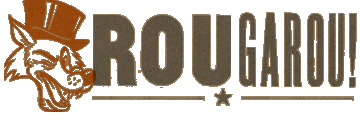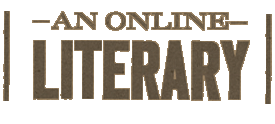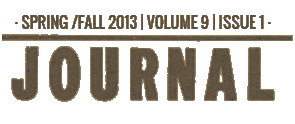· SPRING /FALL 2013 | VOLUME 9 | ISSUE 1 ·
Rougarou, an online literary journal.
I Imagine You Haven’t
Michael Onofrey
They were languid in their poses and in their movement and it didn’t matter if they were on the mattress or on the couch or in the kitchen at the big table that was made of two-by-fours and plywood. An old Victorian turned into four apartments and his was on the second floor of that two-story building, not hugely majestic like some of the Victorians in town, but nice enough — hardwood floors, slanting ceilings, cut glass in some of the windows. The bathtub had feet. It was a space made for posing — one here, one there, movement between these junctions measured as if they were modeling. Not fashion modeling. More like praying mantis modeling. They were both bone-thin, but his bones had elongated muscle.
Her name was Mara. His was Wayne. This had started two years previous with Mara attempting to sketch Wayne, paper and pencil, intent on transforming these graphite images into watercolors her plan. She was after the raised veins, the vertical face, the endlessness of long limbs. But the watercolors never happened.
Mara was so easygoing. And neat. Even when she came to stay for a week between apartments, miscellanies left at a girlfriend’s place, she only brought a suitcase that was the size of a tubby briefcase, a shopping bag’s worth of clothes, everything fitting neatly into a single drawer of a four-drawer chest of drawers. Wayne was similar, his wardrobe in the other three drawers.
The apartment was ‘space.’ Officially it was “furnished,” but within that furniture was meager, or perhaps simply sufficient. Wayne added an end table for the couch, and a lamp and a clock radio for on the floor near the head of the mattress. The lamp was about a foot in height and had a stiff, tawny shade. A large kitchen had tall windows along one wall, makeshift curtains, thin red, and of course that homemade table, courtesy of the landlord who entertained carpentry as a hobby. Exiting the kitchen there was a large rectangular room with an alcove at the one end where a queen-size mattress, no box spring, no frame, fit. A window, upper portion cut glass, occupied the end of the alcove. The bathroom, off of the kitchen, had a toilet and a footed tub and a mirror. There was a stove and a refrigerator. There was a couch. There was a chest of drawers. There was a gas heater that showed a row of blue flames through a glass portal. It was the kind of place that invited walking barefoot and naked on hardwood floors.
Mara’s face was sometimes ravaged with acne. Lesions appeared on Wayne’s limbs, mostly his legs. They had this on-and-off relationship, Wayne and Mara, that was contingent on convenience. They never said anything about love. They never said anything about the future. Until:
“I’m leaving next month.”
They worked at the same place, a tavern. A beer and wine establishment, hamburgers sizzling on a slab of steel, clam chowder from a can that people raved about, chili and beans with the same status, from a can and garnering compliments. Perhaps it was the sea air that spiked appetites which in turn made the food delicious. It wasn’t advertised as canned, of course. It was simply served. If anyone ever asked about recipe, and few did, Wayne would say that it came from a can, thus eliciting chuckles.
Mara was a waitress, Wayne a bartender/cook, and also the manager. Not the owner, but the manager. They, Mara and Wayne, worked the dayshift, which left them their nights. The ocean was a half-block from the tavern. They sometimes went out on the pier for a drink after work. He drank beer. She drank white wine. Wayne’s apartment was ten minutes by bicycle from the ocean/tavern/pier, a comfortable situation.
This pronouncement of flight was Wayne’s, its delivery occurring on a misty night in May, about 3 a.m. On the clock radio next to the mattress a country-western station whispered, lamp with the stiff shade nearby, a golf-ball-size light bulb in its socket, tint amber. They were through with the first round and they were waiting for the second, waiting for Wayne. The hour of the night was hardly unusual for them, bars in town closing at 2 a.m. Mara was toward the window-side of the alcove. Red cloth, serving as a curtain (like in the kitchen), was drawn over the window. Mara had a stemmed glass with dry white wine in it, the glass in her one hand. She was propped up on an elbow. Wayne was turned on his side and was also up on an elbow, which brought his torso off the sheet of the mattress, blanket folded neatly and on the floor next to the foot of the mattress. Wayne’s back was toward Mara, Wayne’s front side facing the room as it lay in amber hues that diminished in conjunction with source and distance, stiff-shaded lamp the source.
Wayne added, “I’m going to give Jack a month’s notice on Monday.”
After listening to this, Mara allowed for a gruff, giggle/laugh, a raspy sound. On the clock radio a Patsy Cline tune played.
“The place is going to fall apart,” Mara said.
“No, it won’t,” Wayne said. “Jack and that tavern have been through so much turnover that it’s part of the business. He’ll find someone else to manage the place.”
Wayne had set his can of beer on the floor next to the mattress and he was working some crank into four lines on a big mirror that was also on the floor next to the mattress, razorblade chopping and raking the slightly yellowish dust into equal lengths. That distinct sound—razor-thin steel on a sheet of glass. Music from the clock radio was in background, a Friday night turned Saturday morning, Mara and Wayne with weekends off, seniority awarding them this semblance of regular employment.
“What are you going to do?” Mara asked, and in reply there was a pause, which constituted space in what characterized their spacious conversations.
“The eastern Sierras,” Wayne said, “near a place called Bridgeport. I’m going to go up there and camp and fish. Take the Greyhound or Trailways, whichever. I used to go up there when I was in high school. Maybe I’ll hike into the backcountry. I got my eye on this pup tent at the sporting good store over on Pacific. The tent’s got a rain fly. It’s a good tent. A bit pricey, but I’ll need it.”
Mara sipped her wine.
“I got to stop this,” Wayne said. “I’m in too deep here.”
“You seem okay to me.”
“These lesions on my arms and legs.”
“They’re not real bad.”
“My gums bleed when I sleep.”
Wayne picked up a cut-down straw and did two lines and picked up the mirror and brought it over his body to offer the remaining two lines to Mara, who did them simply and casually. No dramatics, no excessive snorting noises, no going off with the mouth or jerky movements. All that had been left behind, tolerances established long ago. Even sex was manageable now, and predictable at certain stages of the evening, or daytime for that matter, stages of rolling ascent and descent, not jagged, not abrupt. Relaxed, nothing rushed — poses.
Wayne brought the mirror back over his body and set it down on the floor, two-and-a-half-inch plastic straw and razorblade left on the mirror. He picked up his can of beer and brought it to his chapped lips.
“I’m going to be alone up there,” Wayne said, after having set the can down and turned upward, so as to give Mara his profile, his two elbows dug into the mattress. “I got to walk away from this — the tavern, the apartment, the fun.”
“Oh?”
“It’s a package deal. I got to set the package down and walk away.”
He looked at her, looked sideways to see what was on her thin face, but found no expression. Her complexion was in pretty good condition at the moment, blemishes not too bad. Mara had dry, light brown hair and it came to just touching her shoulders and she kept it kind of thrown back, but one side would hang down loosely when she was stretched out and on her side and up on an elbow. A sour drip had begun at the back of their throats, but they no longer talked about that because it wasn’t worth mentioning.
Wayne took Mara’s glass from her, and with his can of beer in one hand and the wine glass in the other he walked the length of that long room, dissipating amber light on the hardwood floor. Wayne disappeared through the dark doorway of the kitchen. Mara saw the light from the inside of the refrigerator brighten the doorway. When Wayne emerged the wine glass was two-thirds full, can of beer in the other hand. And there was Wayne, walking barefoot and naked, with Mara propped on an elbow watching as he approached through that amber tint until he stopped in front her, her eyes rolled up to look at him. He leaned and handed her the glass.
Instead of stretching out next to Mara, Wayne sat on the edge of the mattress with his feet on the hardwood floor, clock radio, mirror, and lamp to his left. This gave Mara a view of Wayne’s back. Wayne liked to look out over the length of the room and Mara knew this, for they had talked about it, and she sometimes sat next to him and looked out at the room while at his side, which constituted intimacy, perhaps because they both had lived in lesser places.
“How long are you going to stay in the Sierras?” Mara asked, which wasn’t an idle question, for she understood the Sierra Nevada. She was from Lake Tahoe, California side.
Wayne sipped his beer. Mara sipped her white wine, a dry wine that Wayne bought it at a bistro-like wine bar nearby, entrance by way of an alley, one flight up via a narrow staircase, wine relatively cheap and relatively good. He bought it mostly for Mara, but sometimes other people would visit.
“Trout season closes at the end of October. Campgrounds close up then, too.”
“The end of October?” Mara questioned.
Wayne didn’t add anything, so Mara knew, as she so often knew with him, that he wasn’t kidding. She laughed again, a gurgling sound that rose from her flat stomach. Wayne could not only feel this laugh, but could see it in his mind as he gazed at the room — the shaking along Mara’s skinny body, the rippling of taut flesh, the turn of her thin mouth. In South Lake Tahoe Mara had worked at a coffee shop, the morning shift, trades people mostly and mostly men. As she described it: “The tips were good.” Hiring and firing were part of Wayne’s managerial duties. He had hired Mara, knowing that she’d work out just fine, but not so much because of the waitressing experience, but more for the way she had sat on the fold-up metal chair in the so-called office upstairs for the so-called interview, and how she had dressed neatly in simple clothes, and how she had talked, for in that talking she had tried to be polite. It was plain that she wanted a job, that she needed a job. But most of all, there was that laugh/giggle, which implied a trip around a long block, yet humor remained, or survived — married and with a child, then divorced, then busted (a year’s probation), which resulted in her ex-husband getting custody of the child, a five-year-old daughter. These particulars, of course, came later, not during the interview, their relevance simply serving as verification for what Wayne had heard in that laugh. What had brought the laugh was Wayne’s asking: “What if some jerk tries to pinch your ass?” This in reference to on-the-job hazards. “Well, I don’t have much of an ass to pinch.” And she had looked at him, and so he began a smile, and she began a laugh.
“After October, Wayne? After the snow starts falling?”
“Look for work. I’m thinking of Bishop.”
“A bar?”
“No, not a bar. I’m thinking more like painting and handyman work — housepainter, handyman, maintenance. Motels in Bishop. I’ll try those first.”
The song on the clock radio ended and a disc jockey came on. Wayne reached and switched the radio off.
“Camping, fishing, cooking over a fire, collecting wood, getting water, washing, dealing with the weather — physical. I want ‘physical,’ and I want physical to continue in the kind of work I get, because physical is what I need to do this.”
“Do what?”
“Get straight.”
A pause, silence its description, as if in that pause they were posing.
“I want to become like a normal person again, because right now it’s a memory.”
Mara rose up into a sitting position, cross-legged posture, her flat butt on the sheet of the mattress. She was to the side but still in back of Wayne, his long face partially in profile. She brought her glass up and sipped, a small sound. Wayne knew it al l— her movement, her settling into a cross-legged position, her sipping. Even her swallowing he knew as it registered along her thin neck. After that, after swallowing, he knew she was sitting and waiting.
“Methamphetamine,” Wayne said. “You can do just about everything on it, everything and anything, and just about everything becomes fun — working, talking, drinking. Even washing dishes is fun, or slicing cheese. But drinking. . . Imagine — alcohol without a hangover.
“It’s almost cheap. Not like coke, where you got to be tooting up every ten minutes and then running to an ATM. Of course there are minor problems. Sleeping and eating for example. Not the eating problems most people have. Just the opposite. And sex, at certain times, is impossible. But at other times. . . very possible.”
Mara laughed, a low, gurgling giggle that gained a rasp as it tumbled from her throat. But there was something more, and it was as if she had been waiting for this opportunity in Wayne’s discourse to deliver it, waiting to inject that laugh and waiting to tell him to lighten up by way of that laugh.
That gurgling, guttural laugh crawling along Wayne’s spine, as it so often did. Sometimes when she was sitting on top of him moving her skinny body, he’d tell her to laugh, and when she laughed it would send the situation into animation, a place that was dreamlike. He once asked her where she had gotten that laugh, and she had replied, “I used to drink whiskey.”
But there was now a hint of something foreign in that laugh as she sat cross-legged in back of him. He twisted around to look at her and she nearly smiled. She had a way of doing this — almost smiling, and it was similar to what the laugh supplied — irony.
Wayne only looked at that half-smile, and she allowed this, as if posing.
Bringing an arm around, Wayne put a hand on Mara’s left breast, the hand without the can of beer. This seemed to please her, for she brought her wine glass up and sipped, her eyes looking at Wayne’s eyes over the rim of the glass, half-smile persisting. Another juncture. Another pose.
When Mara lowered the glass, she said, “You’re going to be lonely up there.”
“Yes,” Wayne replied, but amended this: “Alone and scared.” His hand was still on her breast.
“Scared?”
His hand went to the other breast. Mara put her head back and shook her hair.
“I’ve never done this before,” Wayne said.
Mara’s head was tilted back, but now she straightened her head and said, “I imagine you haven’t.”
“And beyond that, beyond the ‘doing,’ what if I fail?” Wayne said. “What if I give up on it and come back to all this?”
“Is this so bad?”
“That’s just the thing — this is far from bad. But there’s a curve. Not a learning curve. A different kind of curve.”
A pause, a pose, as if posing were a form of considering one’s self in a particular situation, and how that might appear to others.
Mara brought a hand to Wayne’s forearm, the forearm that was in front of her with the hand on her breast. She moved the tips of her fingers along a raised, meandering vein, her other hand holding the glass of wine.







